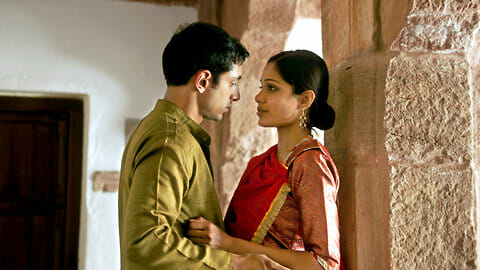
For more than twenty years, Michael Winterbottom has kept up a restless pace, directing almost a movie a year. So he can’t be faulted for being lazy or blocked. And there’s always thoughtfulness, a sense of purpose at the core of everything he’s attempted. But, perhaps as a symptom of his assembly-line approach to his filmmaking, Winterbottom’s track record is, by and large, pretty mixed. For every In this World and A Mighty Heart, he’s churned out half-baked product like Code 46, 9 Songs and his latest, Trishna Winterbottom’s adaptation of Thomas Hardy’s Tess of the d’Ubervilles.
Winterbottom transposes the story’s 19th century rural English settings to modern-day western India. On the one hand, it’s an inspired choice to superimpose Hardy’s themes of conservatism vying with modernization in an industrial society onto 21st century India, a place whose rural populace is now encountering what those in Hardy’s novels encountered more than a century ago. But Winterbottom’s lack of first-hand familiarity with Indian family and social life drains Trishna of any feeling of authenticity.
Trishna tracks the downward spiral that ensues once the titular character, a pretty 19-year-old hospitality worker at an upscale Rajasthan hotel, falls in love with the hotelier’s feckless son. The more the impressionable Trishna (Freida Pinto) is swept off her feet by Jay (Riz Ahmed), the more she sinks into a kind of emotional and sexual enslavement to him. There’s no looking back once Trishna finds out she’s pregnant after an encounter with Jay and loses her good name following her abortion. Shunned by her father, Trishna leaves her working-class family and goes to live with Jay in his new digs in Mumbai.
For a while, Trishna enjoys a romantic freedom, a make-believe honeymoon with Jay. She entertains dreams of becoming a Bollywood dancer, socializes with fellow Bollywood aspirants. But when she confides in Jay about her abortion, the news drives a wedge in their flimsy relationship—a relationship founded on fantasy—and sets the stage for Trishna’s servitude to her lover and the story’s unraveling. Of course, anyone familiar with Hardy’s novel knows how these things end, and while Trishna stays true to Tess’s bottoming-out into tragic despair, Winterbottom’s version doesn’t feel earned so much as a slogged-toward, foregone conclusion.
Pinto and Ahmed hit their marks and gamely dredge up powerful emotions. Trishna’s delusional happiness, her mixed-up feelings of love and entrapment, and the tragedy of her existence in general are all palpable in Pinto’s performance. And Ahmed conveys his character’s sense of moneyed indolence and entitlement—sexual and otherwise—capably. But what’s missing is the crucial element of surprise. Neither Trishna nor Jay are particularly compelling creations outside of Winterbottom’s Tess template. Neither character interests us very much outside of the attractive figures we meet early on. And to be in the company of two-dimensional characters in a one-way narrative for two hours is both sad and frustrating.
Winterbottom also enforces Hardy’s rural milieu onto India’s Rajasthan—specifically, Trishna’s impoverished family life. Again, we understand where each character fits into Trishna’s template: the defeated drunkard of a father, the ever-loyal mother, the doting siblings, the brooding matriarch. But these characters hardly take hold, and here is where the efforts of an indigenous filmmaker might have worked wonders, giving us a more authentic sense of how siblings, parents and children, husbands and wives, and workers in the fields all relate to each other in rural India. Winterbottom does a better job with his Mumbai scenes but only by default, because the city’s more cosmopolitan vibe squares with a Western mindset.
There is an irritating subtext throughout Trishna of the beckoning allure of fantasy. TVs are everywhere, projecting Bollywood song-and-dance, inviting the impressionable into the Bollywood jungle, where they will inevitablly fall prey to deceit. These images create an easy irony in the movie—the tragedy of fantasy in an oppressive society—but that’s as far as it goes. Winterbottom, however, seems to think it’s a message worth repeating ad nauseum in a movie already rife with the simplistic.
India is not England, past or present. It has cultural dimensions uniquely its own in the way men and women see each other, and how women are treated. What ought to have been the foundation for Trishna—the society and the characters inhabiting it—are merely cogs to be hammered into a shape that fits Hardy’s template. The results are dismal and unconvincing.
Director: Michael Winterbottom
Writer: Michael Winterbottom
Starring: Freida Pinto, Riz Ahmed, Roshan Seth, Harish Khanna, Anurag Kashyap, Neet Mohan, Aakash Dahiya
Release Date: July 13, 2012